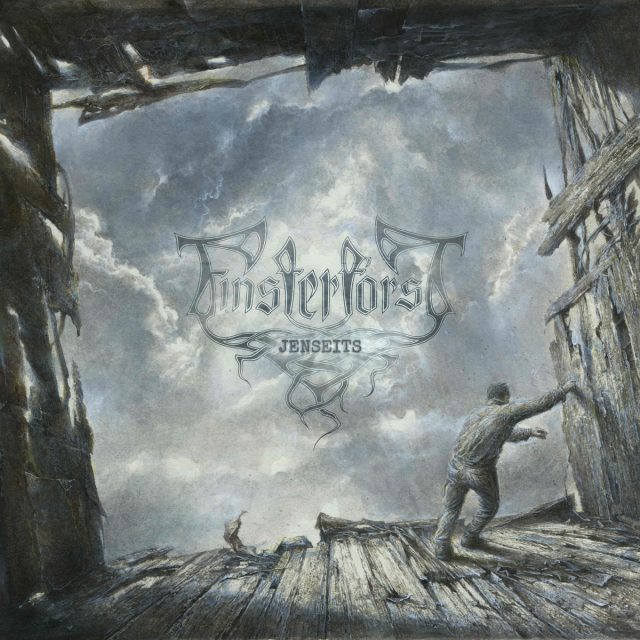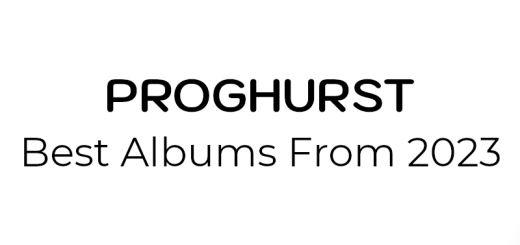Finsterforst: ‘Jenseits’ Review and Interview

Album art for Jenseits
If I were tasked to pick one and only one aspect about progressive music that I like the most, it is the art of very long tracks. Now, don’t get me wrong, anyone can export half an hour of random white noise and call that a long song; the true challenge is to make a track of that length that is actually worthy of its duration. Cut out any piece and suddenly it doesn’t work anymore, that’s when you know you succeeded.
The German Metal band Finsterforst did not only reach that goal, but overshot it by a mile with their recent EP release Jenseits (Beyond), a single 39-minute track divided into four chapters. Meticulously crafted over the span of over two years and funded through Kickstarter, after many delays it finally saw the light of day.
Now, one thing has to be pointed out to anyone not already aware of Finsterforst: this track is far from their first attempt at a long track. In fact, pretty much all their releases had at least one track exceeding the 20-minute mark. This is especially true for ‘Ecce Homo’ from their last album, which was already 36 minutes long. You might be asking, what makes Jenseits so special, if it’s only 3 minutes longer? In one word: density. Whereas Ecce Homo could’ve probably been trimmed off a couple minutes, Jenseits wouldn’t work with even a second stripped away.
Densely layered arrangements, heavy guitars, crushing drums, choir vocals, and insanely brutal vocals. While the lyrics are exclusively in German, any potential language barriers should not detract one bit from the mood.
Let’s have a little walkthrough. The first chapter Freiheit (‘Freedom’) directly starts with some of the signature epic vocals by Johannes Joseph, followed by a bombastic intro that will hint at the vibe the song is going for throughout its runtime. This is followed by a mid-tempo jam that leads into a euphoric hook, and straight back into the jam. You will also get a taste of the ecstatic vocal sections sprinkled throughout the song. For Finsterforst’s standards, this chapter is probably the one that could stand on its own the most as a standalone song, which is likely why it was also chosen as the first single.
From here on, we directly transition into the second chapter Dualität (‘Duality’). If the first chapter was too happy-sounding for you, this one should rid you of such thoughts within moments. The mood turns dark – gone is the dream of utopia; the realization of the disruptive modern social media life we’re living in gets criticized with unmistakable anger and mockery, and how that mentality dragged itself into society.
The anger turns into introspection in the next part Reflexionen (‘Reflections’). This is the shortest chapter of the whole song and mainly serves as a pacebreaker both thematically and musically. Drums are replaced with subdued percussion, guitars become acoustic, and the trademark Finsterforst accordion gets a lot of spotlight as well. Where the previous part turned the criticism outside, here it’s the narrator reflecting on himself.
This narrative healing process reaches its climax in the fourth and final part Katharsis (‘catharsis’). Standing at over 15 minutes on its own, it is undoubtedly the heartpiece ‘jenseits’. If Finsterforst held back before, this time no holds are barred. The section continuously evolves into pure, unfiltered ecstasy. This is most apparent by the urgent plead to be finally freed, a wish that would get fulfilled as the song progresses. The thematic climax is underlined by a massive blast-beat section with tremendous bombast of all instruments the guys have at their disposal.
Suddenly, all music stops without warning, leading into the last movement of the song, a reprise of the opening lines from the very start of chapter 1. It neatly ties the entire song together, but doesn’t leave the listener hanging like the song has a happy ending; indeed, the final words “Before you get it, you will run out of time” show that the battle isn’t won at all. You will be left with an edging outro for about a minute before it’s all over and Jenseits concludes.
As you may have noticed, I chose to focus more on the lyrics than just the instrumentation. Mainly because despite having very strong Black Metal and Folk Metal influences, Finsterforst never really sing about woodlands or elves. Their lyrics are as contemporary as can be. But don’t take my word for it: who better to talk about the meaning of it all than the man who wrote the lyrics: Oliver Berlin! He was kind enough to give some insights (translated from German):
I’m a social worker and at some point I really dug into sociological topics. Of course, I’m not always right about it, but you do learn a pretty analytical view of society and there are great masterminds to be inspired by.
I wrote the lyrics for ‘Jenseits’ when Covid was really boiling. It started with vaccinations, and at the same time, part of the people talked about dictatorship, while the other part was not embarrassed about their demands either, and in the USA some idiots stormed the Capitol because the orange man drove them subtly more or less to it.
And I wondered why so many people were so hysterical, no matter which direction you looked. At some point I finally came to the realization that it’s really only happening on the internet. Face-to-face conversations never escalated like this, and in my eyes this was due to the absence of an audience. There is a book by Erving Goffman called ‘Wir alle spielen Theater’ [english title “The Presentation of Self in Everyday Life”], which describes that we all perform self-dramatizations situationally. For example, I go to work differently than I walk on stage, because neither would work in the other role. And that’s where social media comes in, because the boundaries are no longer perceptible. This wouldn’t be a problem if everyone was aware of it, but we’ve just seen that with Covid: many people have completely drifted away into fictitious bubbles.
In addition, we are constantly in competition with others on social media. Whether it’s outfit, vacations, life hacks, etc. Everyone wants to be unique. Of course it doesn’t work, but it does something to the head and creates such an unrealistic expectation.
I could combine this with criticism of capitalism, Nietzsche and much more, but overall you can say that the lyrics are my rejection of the current times, without being fundamentally against globalization, digitization, etc.
Thank you very much for taking the time to speak with us Oli! And to you, the reader: If you have 39 minutes to spare, check out Jenseits right now! I guarantee you won’t regret it.









